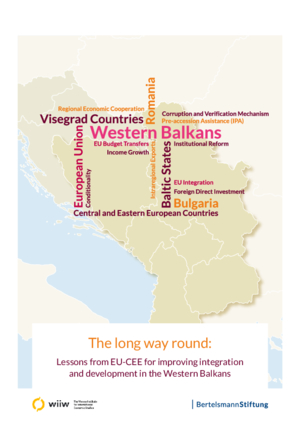The long way round: Lessons from EU-CEE for improving integration and development in the Western Balkans
Mahdi Ghodsi, Richard Grieveson, Doris Hanzl-Weiss, Mario Holzner, Branimir Jovanović, Stefani Weiss and Zuzana Zavarská
Joint Study No. 2022-06, June 2022
in cooperation with BertelsmannStiftung
53 pages including 13 Tables and 24 Figures
This study aims to derive some lessons from the EU accession process of the Central and Eastern European EU member states (EU-CEE) for the Western Balkan economies. More precisely, it investigates whether EU accession has improved regional economic integration in EU-CEE, what are the suspected reasons for this, and which lessons can be drawn from this experience for the Western Balkan economies. Three types of regional economic integration are analysed: trade in goods, trade in services, and regional foreign direct investment (FDI). The main finding is that the best way to foster regional economic integration and development in the Western Balkans would be through policies aimed at raising incomes. One way in which this can be achieved is by increasing the EU transfers for the region, for example, through full access to the EU budget, with the necessary conditionality attached.
Reference to wiiw databases: wiiw Annual Database, wiiw FDI Database
Keywords: EU integration, regional integration, Western Balkans, trade, FDI, growth
JEL classification: F10, F15, F21
Countries covered: Albania, Bosnia and Herzegovina, Bulgaria, Croatia, Czechia, Estonia, EU-CEE, Hungary, Kosovo, Latvia, Lithuania, Montenegro, North Macedonia, Poland, Romania, SEE, Serbia, Slovakia, Slovenia
Research Areas: International Trade, Competitiveness and FDI
Press Releases
Related News
- A new EU strategy for the Western Balkans
- wiiw and Bertelsmann Stiftung presented study on a new EU strategy for the Western Balkans in Brussels
Related Events
- A new EU strategy for the Western Balkans: Lessons from EU-CEE and the Russian invasion
- EU's role in the Western Balkans economic integration and development.
